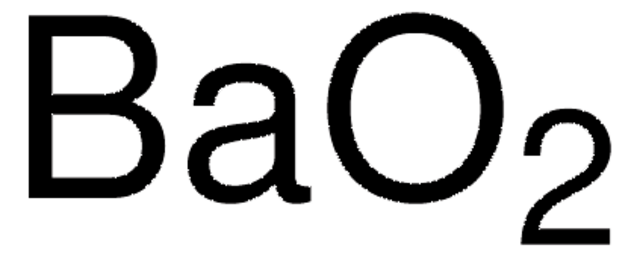All Photos(1)
About This Item
Linear Formula:
NH4ClO4
CAS Number:
Molecular Weight:
117.49
EC Number:
MDL number:
UNSPSC Code:
12352300
PubChem Substance ID:
NACRES:
NA.21
Recommended Products
Quality Level
Assay
99.5% trace metals basis
form
powder
reaction suitability
reagent type: oxidant
density
1.95 g/mL at 25 °C (lit.)
SMILES string
N.OCl(=O)(=O)=O
InChI
1S/ClHO4.H3N/c2-1(3,4)5;/h(H,2,3,4,5);1H3
InChI key
HHEFNVCDPLQQTP-UHFFFAOYSA-N
Looking for similar products? Visit Product Comparison Guide
General description
Ammonium perchlorate is widely used as an oxidizing agent. The orthorhombic crystals of NH4ClO4 converts to cubic crystal system at temperatures higher than 240°C. CuO nanorods promotes the thermal degradation of ammonium perchlorate.
Application
Ammonium perchlorate (NH4ClO4) may be employed for the purification of as-made “pure” mesoporous silicas via oxidation.
Signal Word
Danger
Hazard Statements
Precautionary Statements
Hazard Classifications
Eye Irrit. 2 - Ox. Sol. 1 - STOT RE 2
Storage Class Code
5.1A - Strongly oxidizing hazardous materials
WGK
WGK 1
Flash Point(F)
Not applicable
Flash Point(C)
Not applicable
Personal Protective Equipment
dust mask type N95 (US), Eyeshields, Gloves
Choose from one of the most recent versions:
Already Own This Product?
Find documentation for the products that you have recently purchased in the Document Library.
Mesoporous silicas prepared by ammonium perchlorate oxidation and theirs application in the selective adsorption of high explosives
Yang R, et al.
Microporous and Mesoporous Materials : The Official Journal of the International Zeolite Association, 168, 46-50 (2013)
Synthesis of CuO nanorods and their catalytic activity in the thermal decomposition of ammonium perchlorate
Chen L, et al.
J. Alloy Compounds, 464(1), 532-536 (2008)
Johanna Bünsow et al.
Journal of colloid and interface science, 326(1), 61-65 (2008-08-05)
We report on electrochemically prepared hydrogel layers of poly-N-isopropylacrylamide (pNIPAm) and on the influence that the supporting electrolyte has on their thickness and morphology. Ions that are destabilizing in the Hofmeister sense increase the thickness. The effect correlates well with
Mary E Gilbert et al.
Environmental health perspectives, 116(6), 752-760 (2008-06-19)
Perchlorate is an environmental contaminant that blocks iodine uptake into the thyroid gland and reduces thyroid hormones. This action of perchlorate raises significant concern over its effects on brain development. The purpose of this study was to evaluate neurologic function
Fenghong Wu et al.
Environmental toxicology, 27(8), 445-452 (2010-10-01)
Perchlorate, a kind of inorganic chemical, is mainly used in defense industry and widely used in other civilian areas. It was well known that perchlorate exerts its thyrotoxicant effect on thyroid homeostasis via competitive inhibition of iodide uptake. However, some
Our team of scientists has experience in all areas of research including Life Science, Material Science, Chemical Synthesis, Chromatography, Analytical and many others.
Contact Technical Service









